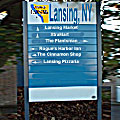- By Dan Veaner
- News
 Print
Print  The Town of lansing finally has a sign law. The law passed with unanimously over a year after town officials realized the Town sign ordinance had been inadvertently rescinded when Lansing zoning was updated in 2005. The law defines the kinds of signs, permitted sizes, and areas of the town in which they are allowed.
The Town of lansing finally has a sign law. The law passed with unanimously over a year after town officials realized the Town sign ordinance had been inadvertently rescinded when Lansing zoning was updated in 2005. The law defines the kinds of signs, permitted sizes, and areas of the town in which they are allowed.There were few speakers at a public hearing to get input on the law. Park Outdoor Advertising's Paul Simonet asked the board to change a part of the law from requiring a variance for signs not covered. He told the board that requiring a special use permit rather than a variance as set out in the law would be friendlier to local businesses like his. The company owns a series of billboards, many of which are in the Town of Lansing. He noted that Park Outdoor Advertising has been a good citizen for many years, and said he would prefer the change go into the law before it was passed.
But Town Attorney Guy Krogh said that was not a trivial change to the law because it would wrest authority from the Zoning Board of Appeals and place it in the hands of the Town Board. He said such a change would require another public hearing, which would delay adoption of the law yet again. Councilman Ed LaVigne said he was anxious to get a sign law on the books after all the time that has been spent on it.
Code/Fire Enforcement Officer & Building Inspector Lynn Day said he also wants a law on the books so he has something to enforce. He said that he would like to work with the law for about a year to see what works and what needs adjustment, and that he would be open to looking at the change at that time. Day noted that Park Outdoor Advertising has no plans to erect new signs in the near future, and that it is likely that by the time they do the change will have been made.
Town officials realized they had no sign law because of a neighborhood disagreement just iver a year ago. Cayuga Signs, an established sign company nestled on Asbury Road, had installed a small digital sign along the road. Business owner Craig Christopher had complied with what town officials thought was law, and was issued a permit. he had also agreed not to run the sign at its full intensity, to use longer durations of messages and to turn the sign off at night. But neighbors protested that they wanted the sign removed.
While the new law states that electronic message display signs are only allowed in commercial sign districts subject to site plan review, existing signs are grandfathered according to the law.
Illuminated signs must be turned off between one hour after sunset and sunrise, except business identification signs, which can be illuminated during normal business hours. In residential areas commercial signs cannot exceed 18 feet and signs for home businesses are restricted to 9 square feet. In Agricultural sign districts the limits are 48 square feet for commercial signs and 24 square feet for home based businesses. In commercial sign districts those limits are 28 and 12 square feet.
Temporary signs like political lawn signs or real estate 'for sale' signs are allowed, but the small signs on public land that advertise businesses will not be permitted. The Town is considering erecting strategically placed wayfinding signs that would replace the haphazard collection of signs dotted around town with a few attractive signs pointing drivers to local businesses.
Even grandfathered signs must be maintained according to the law.
The law passed 5/0.
v10i7



